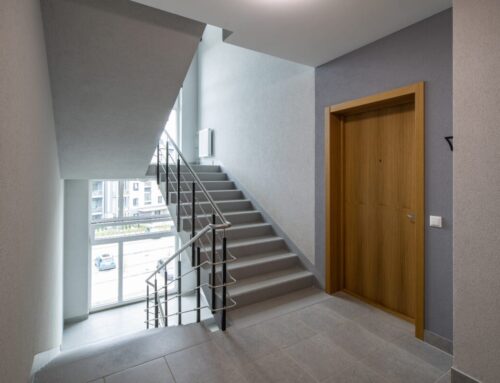Belinda Thorpe, Managing Director at Residentsline Flats Insurance explains what policies are available to ensure your block has the adequate cover in place.
Residential Buildings Insurance
Residents’ Management Company (RMC) directors and committee members often take on the task of arranging buildings insurance on behalf of their fellow residents. Ensuring your block is adequately covered is a major responsibility and ensuring a competitive price as well as comprehensive protection for leaseholders’ property can be quite a challenge.
First, it is important to ensure that your Buildings Sum Insured is adequate and that the cover you obtain is wide enough to protect the interests and investment of you and your fellow flat owners. Should disaster strike building material and labour costs continue to rise and it is vital to ensure that you take out insurance based on an up-to-date reinstatement cost assessment. Reinstatement cost assessments should be carried out at least every five years by a chartered valuation surveyor who will take into account any changes or improvements made to the property since the level of cover was first set. Many people wrongly assume that if the cost of repairing their property under a claim is less than the sum insured, it will automatically be paid. This is not true: pay-outs are based on the level of cover being sufficient to reinstate the whole property.
The second (and vitally important) thing to remember, is that policies are not all the same. The company offering the cheapest deal may not necessarily provide the level of cover you need. So, before you take out any policy, check that it includes the following:
- “All Risks” cover (including subsidence)Employers Liability Insurance
- Public and Property Owners Liability cover
- Lessees fixtures and improvements
- Alternative Accommodation or Loss of Rent
- Loss or unauthorised use of Metered Utilities (Water)Cost of tracing leakage of oil or water
- Loss of or Damage to contents in communal areas
- Damage to underground Pipes and Cables
- Unrestricted cover on vacant or rented flats or apartments
- Machinery breakdown
- Damage to fixed glass, shower trays and sanitary fittings
- Storm damage to fences and gates
- Legal expenses
- Replacement of communal door locks following theft of keys
- Personal accident cover for voluntary workers
Most residential buildings insurance policies have a minimum of £1,000 subsidence excess. However, the excess for all other damage is usually negotiable. RMC directors should always check that the description of the property insured is accurate and includes cover for the outbuildings, gates, fences as well as underground pipes and cables that the RMC is responsible for insuring. In addition, review the description of the Property Insured, as some are wider and include much more than others. Also, most policies are index linked to ensure the sums insured remain adequate – do confirm with your insurer that this is the case.
In addition to buildings insurance, there are some specialist areas of cover that RMCs should also be aware of:
Management Liability or Directors and Officers Liability Insurance
RMC directors or officers can be held personally liable for their actions while working on behalf of leaseholders. Taking out Directors and Officers Liability insurance provides defence costs and/or compensation for civil liability charges relating to a “wrongful act” in connection with RMC matters. Such acts are defined as any actual or alleged:
- Breach of trust
- Breach of warranty
- Neglect
- Error
- Omission
- Misstatement
- Misleading statement
Different policies may contain different definitions so do read the small print. There will also be Limitations and Exclusions to this type of cover, for example:
Dishonesty, Fraud, Malicious Conduct or Personal ProfitBodily injury (other than defence costs)Property damageFines, penalties and damagesPollution
Claim examples: Leaseholders of a block of flats successfully brought an action against the residents committee for failing to appoint a building company in a timely fashion to repair external brickwork on the building. Damage had been caused following a heavy rainstorm and reported to the committee, however repair work had not been commenced several months later, when a subsequent rainstorm caused further damage.
This is the kind of situation that could have been successfully “managed” had the committee in question put an appropriate insurance policy in place.
Corporate Legal Liability Insurance?
Management Liability Policies can be extended to include Corporate Legal Liability Insurance which also protects your Residents’ Management Company against the financial consequences of potential claims. Corporate Legal Liability Insurance includes the cost of defence, as well as the amount of awards and damages resulting from any claims made against the Company.
Got a lift? You need Engineering Insurance and Inspection
Most buildings insurance policies taken out on blocks of flats will cover damage to passenger lifts as a result of an insured peril such as fire, accidental damage and malicious damage. However, these policies do not normally extend to damage caused by the breakdown of the passenger lift or to the legal requirement to have lifts regularly inspected.
Enter the specialist Engineering Policy, which many of the specialist insurers offer. Such policies are designed to help property owners comply with their legal obligations to have their lift inspected by a competent authority at six monthly intervals. A record of these inspections must be kept and/or a certificate issued.
Terrorism: could your building be a target?
Do we really know who our neighbours are? Even if you live in the quietest rural area and think your block of flats is never likely to be a target for terrorists, think again. Tempting, isn’t it, when arranging renewal of your residential buildings insurance, to leave out terrorism cover to save a few pounds. After all, how could your property possibly be at serious risk of being a target for terrorist attack?!
Your building may not be a target, but individual residents could be threatened if for example they are employed by a laboratory that uses animals for medical testing purposes. Or you could be living next door to a bomb maker – he or she wouldn’t exactly advertise the fact. A standard buildings insurance policy will not provide cover for a terrorist attack.
However unlikely it might appear, if an incident did occur and there was no insurance in place, the RMC directors could be held responsible. Don’t forget that directors have personal responsibility for their decisions and actions within the Residents Management Company. Taking out the appropriate cover is a small price to pay in comparison to risking your personal assets.
Cyber Liability
In 2018, the UK Government estimated that the cost of cybercrime to the UK economy around £27 billion. Due to the frequent media reports of multinational companies falling victim to global cyber-attacks, Property Managers, Residents’ Management Companies (RMC) and RTM Companies could be forgiven for believing themselves unlikely to be the primary targets of such incidents. However, recent studies have shown that UK small businesses (up to 50 employees) suffer over 65,000 attempted cyber-attacks every day, with hackers’ successfully penetrating IT networks on average every 19 seconds. With results such as these, it is clear that anyone is vulnerable to the potentially devastating financial impacts that come with the use of IT. Small businesses and RMC’s are now widely viewed within the Cyber Security industry as the ‘low hanging fruit’ for cyber criminals, chiefly due to their traditionally moderate IT security budgets and reliance upon third-party providers.
Out of Hours Assistance
If you have an unexpected home emergency such as a burst pipe or boiler breakdown, you’ll want to put things right as quickly as possible to protect your property from further damage and make your home safe and comfortable to live in. It’s not always easy to find a reputable contractor at short notice, and even if you do, it can be expensive.
An out of hours assistance policy provides you with a low-cost solution, ensuring help is always available when you need it most. With one call an approved contractor will come to your home and make emergency repairs.
Cover normally includes all the following domestic emergencies:
- The complete breakdown of your heating system
- Plumbing and drainage problems
- Damage which affects your security including locks and windows
- If your only toilet is broken
- Loss of your power supply
- Lost keys
- Vermin infestation
- Roof damage
For quotes on any of these products either visit our website at www.residentsline.co.uk or call us on 0800 281235.




Leave A Comment